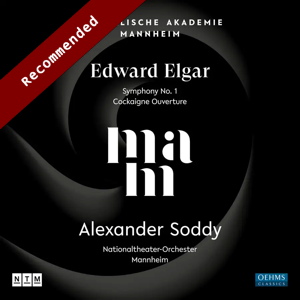
Sir Edward Elgar (1857-1934)
Cockaigne Overture (In London Town), Op 40
Symphony No. 1, Op 55
Nationaltheater-Orchester Mannheim/Alexander Soddy
rec. live, 5-6 June 2023 (overture), 18-19 October 2021 (symphony), Mozartsaal, Rosengarten, Mannheim, Germany
Oehms Classics OC1730 [63]
First-rate sound with nary a hint of audience presence graces this neat little issue in a black cardboard sleeve. We begin with an alternately rumbustious then wistful – typical Elgar – Cockaigne Overture; the Mannheim orchestra seems to relish the myriad colours, textures and unbridled exuberance of a score which marks Elgar out as a great orchestrator. Soddy has the full measure of the work, balancing the bustling passages with the nobilmente sections requiring rubato. It makes a wholly suitable prelude to the main item – which I would unhesitatingly characterise as the greatest English symphony (until I consider the claims of Vaughan Williams’ Fifth, that is…).
This is a surprisingly fast performance of that symphony; overall, at 48 minutes, a full seven minutes quicker than the recently issued live recording from Sir Mark Elder and the Hallé and Sinopoli’s eccentric but compelling account. That is quite a lot less time for a symphony that in Barbirolli’s classic recordings takes 53 or 54 minutes – although to be fair, Sirs Adrian Boult and Colin Davis clock in at around fifty minutes, so Soddy’s speeds are hardly outlandish, nor can I say that I am aware of undue haste when I listen to this beautifully played live account.
I am instead much more conscious of just how lovely this music is – and even if the conductor here is British, I am content to see it played by a fine German orchestra, rather than see Elgar continuing to resist export and remain the province of English bands – though of course, Soddy is not the first to tread this path; there is a fine live recording of this symphony on the Profil Hänssler label from Colin Davis in Dresden in 1998 and Barenboim recorded it beautifully with the Staatskapelle Berlin.
The stately opening march is sonorous and dignified, shot through with…melancholy?…nostalgia? – it is certainly grand yet somehow also sad – unless that is the ageing Brit in me pining for lost glories. Soddy’s slightly more animated speeds lend the music more lift and a sense of forward momentum without compromising its grandeur. I am particularly impressed by the brilliance of the Mannheim bank of brass, who are recorded nicely forward in the sound picture; towards the end of this movement, they really sing out.
The attack on the Scherzo is first absolutely vicious before the delicate, playful Trio – this is really alert, committed playing. I never cease to be pleasantly surprised by the virtuosity of so many German orchestras – though of course Mannheim has a history of excellence, dating back to Mozart and beyond. The segue into the Adagio is seamlessly managed and I love the clarity of the instrumental lines Soddy devises here. Other orchestras create more of a wash or cushion of sound but there is an element of “period” translucency about this performance without any diminution of its opulence or emotionalism. Listen to the succession of individual instruments from around four minutes into this movement to hear what I mean. I still like to hear a “Big Band” approach but this equally valid and rewarding. The shimmering introduction of the most beautiful tune in English music is then transmuted from an intimate musing into the tenderest of codas; it could not be done better.
The hushed expectation of the Lento opening to the finale is deftly executed and the exposition of the restless Allegro section is again vehement, emphasising the “modernity” of Elgar’s invention and the peroration is absolutely thrilling.
As you can tell, I love this recording – which is all the more remarkable for being live – and look forward to hearing more from this source – the Second Symphony, obviously, would be where to go next.
Ralph Moore
Buying this recording via a link below generates revenue for MWI, which helps the site remain free.




















